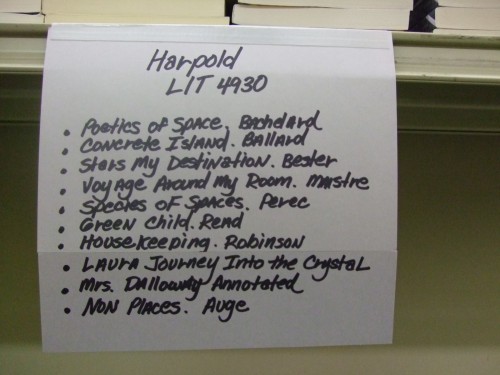Chelsea Martin Rips
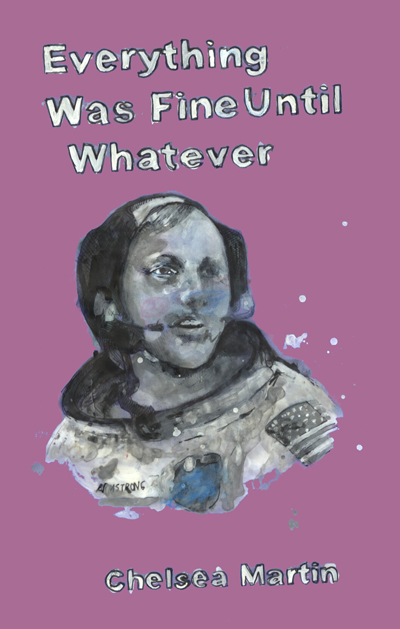
I love Chelsea Martin.
Somebody had said to me, What does Chelsea Martin smell like? & I said, she smells like Chelsea M.
I haven’t met her, but I know.
For real, I have an extra copy of her book Everything Was Fine Until Whatever. I want to give it to someone.
Post a comment in this thread, somehow involving the word ‘Chelsea’ and I will enter you into a drawing for the book. This will go on until whatever.
If you don’t know love, here’s how to find out: I $ You. I have employed some of the ideas here and they have vastly altered the trajectory of my life.
You can also purchase the book with your own $ here: Future Tense Books
Ways of Reading
 Last Wednesday, my wife and I went to see the newest Harry Potter movie, The Half-Blood Prince. As someone who had never read a Harry Potter book yet still enjoyed the previous movies well enough, I was happily willing to go but not especially eager nor overjoyed with anticipation the way my wife and the majority of the audience seemed to be.
Last Wednesday, my wife and I went to see the newest Harry Potter movie, The Half-Blood Prince. As someone who had never read a Harry Potter book yet still enjoyed the previous movies well enough, I was happily willing to go but not especially eager nor overjoyed with anticipation the way my wife and the majority of the audience seemed to be.
As it turned out, the movie was great fun: full of action and drama and mystery and cool special effects. In fact, by the time the end credits rolled I had completely succumbed to its spell: I wanted (no – needed!) to know what would happen next and how things would be resolved.
My wife refused to give me answers: “Guess you’ll have to read the final book for yourself or else wait until the next movie comes out.” Frustrated, I called my brother for answers and he said basically the same thing: “You should read the final book. It’s a quick read.”
For me, a quick read is never a quick read. Unlike my brother and my wife, I tend to read very slowly. So when I picked up the seventh Harry Potter book, The Deathly Hallows, and held the nearly-800 page tome in my hands, I had the distinct feeling that I would be dedicating the rest of my summer to completing it.
July 20th, 2009 / 10:56 am
“Ten Things You Need to Know to Live on the Streets” – a handy guide for the dispossessed, conceived by Walter Mosley, at The Nation.
5 Food and clothing are easier to find than a safe place to sleep–the first truth of homelessness is sleep deprivation. Always have a blanket. Whenever possible, sleep in groups with staggered schedules, so you can look out for one another, prioritizing children’s needs over those of adults.
Which Kind of Bitch Are You? Wise Blood or Child of God
Inspired today by Lincoln Michel’s tweet: ‘Kryptonite or Stay Fly?,’ over which I’ve been conflicted all day (and all night), another question for ya’lls, perhaps the first in a series of ‘WKoBaY’ heads up battles:
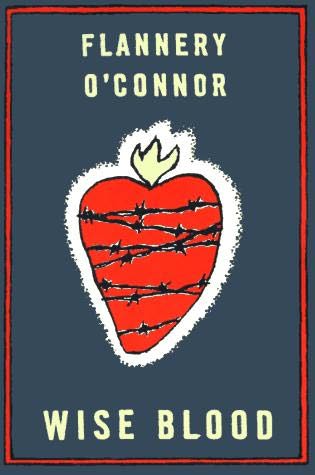 OR
OR 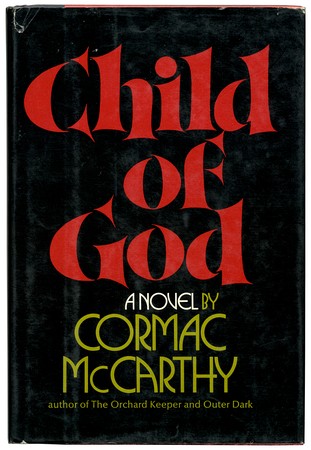 ?
?
A Totally Proven Remedy: notnostrums* issue 3
Those who suffer from random ballads, unrequited ampersand love, sleepwalking in the Donut factory, the need to starve all rabbits to death because you love them like that, a strange anxiety that you are the only one in the world who can’t tell carob apart from chocolate, supplication, irresponsibility, petty secrecy, a reflex by which you clutch epically at whatever night will have you, a bunch of good ideas that you prevent yourself from undertaking because you spend too much time doing laundry, pointed coughs, a whole credit card for the purchase of sunglasses, pony love, pool love, pockmark love, and/or if you are really a spear, a blizzard, or a downfall, and you’ve been faking it through hopskotch and teller interaction this whole time, you will want to click and sink into notnostrums* 3, the new issue of online poetry edited by Guy Petit and Luke Bloomfield. Be sure to gawk the trailer for notnostrums’ upcoming poetry movie If You Think Of It. Roster after the jump. Maybe get some water too.
July 19th, 2009 / 5:06 pm
By Myself by DA Powell and David Trinidad
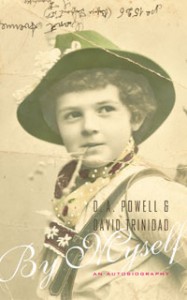 I had a chance to read By Myself (Turtle Point Press) by DA Powell and David Trinidad a week or two ago and wanted to give it a quick treatment here. It’s a three hundred sentence chapbook cobbled together from three hundred memoirs/autobiographies (one sentence per memoir/autobiography – in the back of the chapbook, they’ve noted which sentence comes from what book). So basically, Powell and Trinidad selected one hundred and fifty memoirs each, read/skimmed them, and then traded sentences back and forth one after another to eventually create a patchwork story of someone rising from poverty, becoming successful, dealing with various struggles (such as an unhealthy addiction to birthday cakes), and so on. It’s an arc we might expect to see in an autobiography, right? Here’s how my life is a meaningful story, with a beginning, middle, and end. However, due to the breadth of memoirs/autobiographies from which Powell and Trinidad select the sentences (Tennessee Williams, Kathie Lee Gifford, Gertrude Stein, William Shatner, Gore Vidal, etc.), the narrator’s trajectory is a bit erratic, but in a hilariously good way. Powell and Trinidad cleverly take advantage of this to create some funny moments and some sad moments as well.
I had a chance to read By Myself (Turtle Point Press) by DA Powell and David Trinidad a week or two ago and wanted to give it a quick treatment here. It’s a three hundred sentence chapbook cobbled together from three hundred memoirs/autobiographies (one sentence per memoir/autobiography – in the back of the chapbook, they’ve noted which sentence comes from what book). So basically, Powell and Trinidad selected one hundred and fifty memoirs each, read/skimmed them, and then traded sentences back and forth one after another to eventually create a patchwork story of someone rising from poverty, becoming successful, dealing with various struggles (such as an unhealthy addiction to birthday cakes), and so on. It’s an arc we might expect to see in an autobiography, right? Here’s how my life is a meaningful story, with a beginning, middle, and end. However, due to the breadth of memoirs/autobiographies from which Powell and Trinidad select the sentences (Tennessee Williams, Kathie Lee Gifford, Gertrude Stein, William Shatner, Gore Vidal, etc.), the narrator’s trajectory is a bit erratic, but in a hilariously good way. Powell and Trinidad cleverly take advantage of this to create some funny moments and some sad moments as well.
July 19th, 2009 / 2:40 pm
Help Amanda Nazario Take Her Radio Show Across The Country
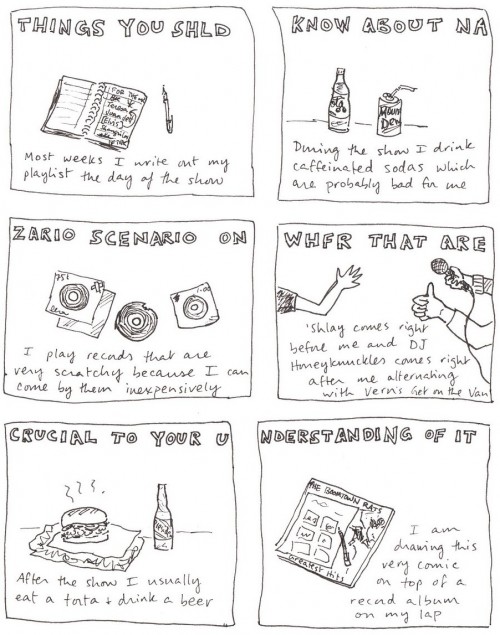
Things You Should Know About Nazario Scenario On WHFR That Are Crucial To Your Understanding Of It by Amanda Nazario
Friend of HTMLGIANT Amanda Nazario needs your help. She’d like to take her radio show, the Nazario Scenario, currently broadcast via Washington Heights Free Radio, across the country in a van outfitted with mobile wifi, a turntable, a cd player, mics, and other cool stuff, but she needs cash.
You can read about her project over at her Kickstarter donations page. The basics are as follows:
-Donations of $10,000 by October 15th, 2009.
-Purchase of a van
-Installation of necessary equipment
-Learn to drive!
-Travel the country broadcasting for WHFR
Pledge your support through the Kickstarter page (watch her video). Comment on her blog. Look at her drawings. Read her stories. Follow her on Twitter. Do nice things for her and maybe she’ll visit your home and make you an honorary DJ or something.
Good luck, Amanda.
Eric Oberauf On The New Publishing Model: Not Boutique But Better
 Eric Oberauf, captain of the publishing house Two Dollar Radio, has a great article in the new Brooklyn Rail arguing that we should be sober but optimistic about the printed book object and its success as a method of literary distribution. In “The Revenge of Print,” Oberauf explains the relevance of independent presses very well, summarizes the identity crisis that passes for a business model at most big and butterchurning book houses, and argues with a thoughtful and historically aware perspective that adapting a “realistic scale” isn’t downsizing expectations but getting back to mattering. What his argument reminds us is that people pay for books not because they’re addicted to mulch, but to read words and like words and carry words around so they can read them some more, which makes the whole thing more communication than commodity. Maybe you’re going to make more friends than money, it’s true. So if corporate book publishers want to continue tricking any cash into falling toward them, they might want to remember that books are closer to party invitations than to coat hangers.
Eric Oberauf, captain of the publishing house Two Dollar Radio, has a great article in the new Brooklyn Rail arguing that we should be sober but optimistic about the printed book object and its success as a method of literary distribution. In “The Revenge of Print,” Oberauf explains the relevance of independent presses very well, summarizes the identity crisis that passes for a business model at most big and butterchurning book houses, and argues with a thoughtful and historically aware perspective that adapting a “realistic scale” isn’t downsizing expectations but getting back to mattering. What his argument reminds us is that people pay for books not because they’re addicted to mulch, but to read words and like words and carry words around so they can read them some more, which makes the whole thing more communication than commodity. Maybe you’re going to make more friends than money, it’s true. So if corporate book publishers want to continue tricking any cash into falling toward them, they might want to remember that books are closer to party invitations than to coat hangers.
Here’s a pull quote:
The goal for book publishers, most simply put, should not be to undertake a virtual arms race of developing technology with both the Internet and media, or to try to compete on a bloated scale with music and film, or even to translate a work to conform to an undetermined potential future model. The mission for book publishers and print media at large should be to create a product that is irreplaceable and indispensable.
Codex Followup: Dr. Harpold’s Syllabus
It’s a love-fest! A couple of days ago I posted about an old essay of mine on an art book called the Codex Seraphinianus, and about all the responses I’ve gotten to that essay over the years. To my enormous pleasure, that post generated a whole new round of reader response, which came in via the comments section here, via email, and via Facebook. A few people who wrote in mentioned Dr. Terry Harpold, the professor at UF who first introduced me to the Codex in a course called Eccentric Spaces and Spacialities. Dr. Harpold, it seems, has the makings of a cult web-following, and that’s a fire I feel is well worth stoking. As it happens, I was down in Gainesville over July 4th weekend, visiting my little sister. I hadn’t been there since 2005, and I was only in town for a few days, so I didn’t even attempt to touch base with Dr. Harpold (or any of my other former profs) but when I visited Goerings Bookstore–which gets the book orders for the sweeping majority of UF’s English department course offerings–I saw the reading list for the most recent iteration of Harpold’s LIT 4930, and snapped the photo you see just above. It seems that the latest version of the course is called “The Literary Representation of Space,” and is being offered Summer B, 2009, ie right now. I’m straight-up jealous of anyone who gets to study Mrs. Dalloway with Dr. Harpold, a book that wasn’t on the syllabus when I took the course. Housekeeping, however, is a Space/s mainstay. It’s one of my all-time favorite pieces of literature. I don’t even know how many times I’ve read it, but I do know that I read it for the first time because Dr. Harpold assigned it to me. One more thing I’ll always be grateful for.
LIT 4930 Summer B – The Literary Representation of Space
Ex-foliations: Reading Machines and the Upgrade Path (Univeristy of Minnesota Press, 2008) by Terry Harpold
A Prehistory of the Posthuman
 New book out from the ever estimable University of Minnesota Press called The Dada Cyborg: Visions of the New Human in Weimar Berlin by Matthew Biro.
New book out from the ever estimable University of Minnesota Press called The Dada Cyborg: Visions of the New Human in Weimar Berlin by Matthew Biro.
“In an era when technology, biology, and culture are becoming ever more closely connected, The Dada Cyborg explains how the cyborg as we know it today actually developed between 1918 and 1933 when German artists gave visual form to their utopian hopes and fantasies in a fearful response to World War I.”
July 18th, 2009 / 8:58 am

